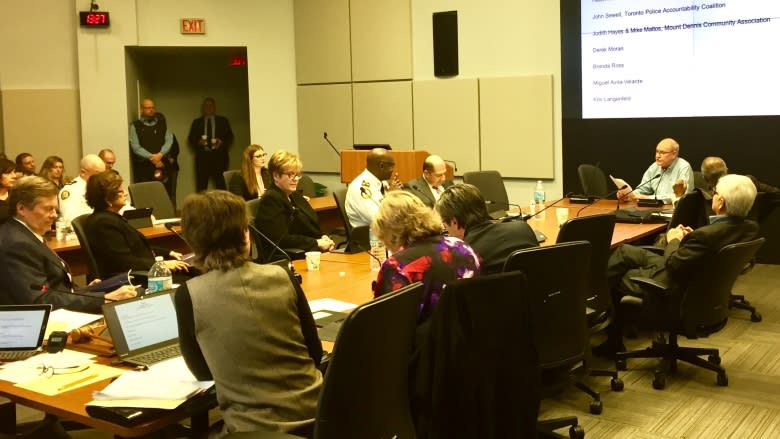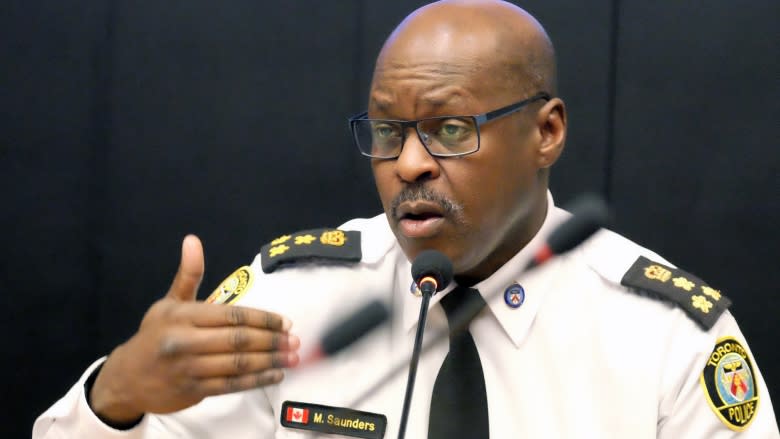Former mayor John Sewell criticizes plan to modernize Toronto police
The Toronto Police Services Board (TPSB) approved sweeping changes Thursday aimed at modernizing policing in the city and agreed to develop a "scorecard" to measure future success — but critics at the meeting remain skeptical.
The TPSB voted to adopt 34 measures contained in the report called Action Plan: The Way Forward, which was presented to the board last month.
That includes the possibility of closing some police stations, a move that those in the targeted 12 Division vehemently oppose.
Other measures include:
- Embedding officers in neighbourhoods for three years at a time.
- Equipping police officers with smart devices, including so-called eNotebooks that will allow them to spend more time out of their vehicles and stations filing paperwork.
- Enhancing human resources efforts to make sure officers have "emotional intelligence" and that when a hiring freeze ends in 2019, the force hires in a way that reflects the city's diversity.
The measures are aimed not only at making policing more efficient and more responsive — but also to rein in the cost of law enforcement, which has risen to $1 billion per year.
But a former mayor of Toronto, John Sewell, and several community activists believe the plan is flawed.
"It's all up in the air. It's just words," said Sewell, who served as mayor for two years and is now a member of the Toronto Police Accountability Coalition. "There's no sense that anything is really being accomplished."
In his presentation to the board Thursday, Sewell said there are missing elements in the plan, and to illustrate his point he quoted from the report itself: "It is our hope that money does not become the focus on discussion in our final reports," Sewell said.
'We're not wingin' this thing,' chief says
Another board member, Dhunn Noria, says the task force that came up with the report has spent $1 million already and plans to spend $3.5 million next year.
But according to the board's agenda, the task force "has identified approximately $100 million in budget reductions and enhanced efficiencies over the next three years," including a freeze on hiring and promotions between ranks.
The board also approved finalizing a scorecard in the quarterly reporting on progress, as described in the report.
"We're not wingin' this thing," Toronto Police Chief Mark Saunders said.
Sewell believes it would be next to impossible to measure change without knowing "what's spent and where it's spent.
"The reason you undertook this is, in fact, you're spending too much money now," he told the board Thursday.
Task force goals are impossible, critics say
Sewell was also critical of another section in the report on gang and gun violence, saying results will be measured in "positive outcomes achieved instead of numbers."
With 74 units in the police force, Sewell said it's reasonable to know "how much are we spending on guns and gangs," and other units given that other city departments have to provide a breakdown of their spending.
And without a specific plan for changing how police interact with the community, modernization won't matter, Sewell said.
Helen Armstrong from St. Stephen's Community House agreed.
She said a recent survey of drop-in residents revealed they felt their rights were not respected by police and urged the police to consider "neighbourhood centred partnerships."
Judith Hayes and Mike Mattos, both of the Mount Dennis Community Association in 12 Division, expressed fears that the division, and others like it might close.
"These are stories, our lives, our youth in Mount Dennis that need protecting. Locals don't want to lose 12 Division having a base in our community," Hayes said.



